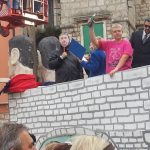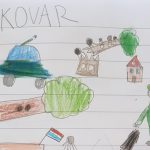Outgoing Croatian President Kolinda Grabar-Kitarovic was in the international media this week, her topic how corruption in Croatia starts with cheating at school. It is not the only thing which starts in Croatian schools.
I don’t normally delve into Croatian politics, as it is rather complex to understand for an outsider, but a recent interview with President Kolinda Grabar-Kitarovic caught my eye for other reasons.
Actually, her interviews and public utterances during a very chaotic, and ultimately unsuccessful re-election campaign have been catching my eye for weeks. Whether it was the bizarre assertion that those who died defending Vukovar during the Homeland War were happy to do so, or that – just a week before the election – President Kolinda had magically struck deals with foreign states which would bring jobs for Croatians living in Croatia for the tidy sum of 8,000 euro per month (almost ten times the average wage in Croatia), something which for some reason could only be made public a week before the election.
(President Kolinda Grabar-Kitarovic interviewed in The Guardian)
Having heard so many things coming from the presidential office in the last five years, I am still trying to figure out what President Kolinda achieved in her term of office.
Apart from becoming the first Croatian to ever touch the World Cup, of course…
The election lost, it is time for President Kolinda to cement her legacy internationally, and I was somewhat intrigued to see an interview with her in The Guardian this week entitled Croatian Corruption Starts with Cheating at School, Says President. In addition to the subject in the title, President Kolinda managed to offend the Croatian Nursing Council who issued a press release after the interview, as well as distance herself from any corruption in Croatia. While she served in the government of convicted criminal, former Prime Minister Ivo Sanader, she was – according to the article – kept away from the big decisions and had no knowledge of everything. There was no mention of the only convicted criminal who organised many of her birthday parties, or her relationship with the mayor of a large Croatian city, whose activities challenge the very notion of being innocent until proven guilty. To name but two.
But the legacy of President Kolinda is not the subject of this article, it is the notion of Croatian corruption starting in schools. While the president did not elaborate on what steps she had taken to tackle this issue during her five years in power, it got me thinking about other things that start in Croatian schools. Cheating in schools is a universal fact of life, and I don’t quite follow the logic of how cheating in a Croatian school is the start of a life of corruption, when cheating in a Swiss school is not. And while it would be a bit much to expect a president to eradicate cheating in schools, efforts to address other, Croatian-made, problems in schools could have a much healthier outcome for the future of this country and its next generation.
As a foreign parent of two girls in the Croatian schooling system, I have been quite surprised by a number of things over the years. The first is how quickly kids in Croatia are conditioned politically. My youngest came out of kindergarten one day and proudly told me that ‘my friend Iva is HDZ and my friend Ivan in SDP.’ She had no idea what HDZ or SDP actually were, but the fact that political parties were even being mentioned by 5-year-olds was a sign of how overtly political Croatian society is – the most political of the 10 countries I have lived in.
Ask a regular British adult on the street how many politicians he or she can name, recognise and know their job title. I doubt the average number would be more than 6. We have no politics in our house and never talk about the subject at home, yet by the age of 9, my eldest knew all about the mayors of Jelsa, Split and Zagreb, Presidents Kosor, Tudjman, Mesic, Kolinda, Prime Ministers Zoki, Oreskovic, Plenky, and there is no party without young Karamarko. This Croatian media obsession with turning average politicians into rock stars is pushing them and their divisive policies into the minds of the youngest in society.
This all happens outside of school, of course, and the first time I realised what an effect schooling in Croatia could have on my kids was early in the morning of November 19, 2013. It was just after 6 am, and my eldest daughter, aged 7 and in her first year of school, came into our bedroom and woke me up. She was shaking, trembling, crying, and I had never seen her like this. I took her into the bed, kept her warm, safe and loved, then asked her what was wrong.
“I had my first nightmare, Daddy, it was horrible.” As I held her tightly, I wondered what in the world could have given her a nightmare. She lived in a loving family on the safe and idyllic island of Hvar, with lots of friends at school. It made no sense.
And then I remembered the date. November 19. Which was the day after November 18. Vukovar Remembrance Day, the day that all Croatia rightly stops to commemorate the sacrifice of those who gave their lives in the brutal siege of the hero city before its fall on November 18, 1991. Did this nightmare perhaps have something to do with Vukovar and what they had learned at school?
“Yes, Daddy, it is horrible. The Serbs came with tanks and they destroyed everything, and then they took an old man and put him on this thing, and then stretched his body, and then they put cigarettes out in his eyes.” And she cried again. “Some of my friends drew dead bodies, Daddy, but the teacher told them that they should not draw dead bodies.” You can see her homework in the lead photo, complete with the red tick and ‘Bravo’ from the teacher.
Seven years old.
Let’s forget about the cheating in schools for a moment, President Kolinda, what kind of society are we building where we are giving our kids and grandkids their first nightmares at the age of seven? Burdening them with the division and conflict of the past at such an early age? It is entirely right and proper that Croatian children should learn about and know of the horrors of Vukovar when the time is right, as well as pay their respects. But at the age of seven, with impressionable kids that age drawing dead bodies for homework? Is it really necessary to poison the minds of the next generation?
Vukovar is a very emotive issue in Croatian society, and I shied away from it until last year, when I decided to take part in the annual remembrance parade, as it had never really been documented in English. It was a harrowing day, but much different to how I had envisioned it. You can read my account here.
I was shocked at how the Vukovar memorial event had been hijacked for political purposes by the politicians of today, President Kolinda included. And when the national focus left the city after its annual day of remembrance, Vukovar returned to its hopeless, abandoned limbo where it has existed ever since peace came. This was perhaps not the prosperous city that those brave defenders would have been happy to die for, as the president claimed, above. Rather than scoring political points and doing nothing to help the survivors of Vukovar, here is how to honour the fallen and assist the survivors.
Cheating in schools is a global problem, and a hard one to eradicate. Giving Croatian kids nightmares from the age of seven is a very Croatian problem, caused by Croatian policies, and extremely simple to eradicate by Croatian politicians.
Now that would be a presidential legacy worth talking about.









